Events and Publications
-

TeqFW Guide: Enum — an architecture assistant for onboarding
I launched a custom GPT chat to align understanding of Enum in TeqFW and support onboarding for the team.
-

TeqFW Guide: DTO — a personal architecture assistant
I launched a personal GPT assistant for onboarding and aligning architectural understanding of DTOs in TeqFW. It conveys a coherent model and helps keep a single architectural voice.
-

Telegram Translation Publisher: ADSM and the guided evolution of an agent-built app
A Node.js CLI built by an agent on top of an architecture defined upfront—an example of controlled project evolution with ADSM.
-

From ideas to code: testing attention theory in practice
I describe my app Mindstream, built with ADSM, where browser attention signals turn into an interest score via embeddings; the original post explains the model and its limitations.
-

Solving the planet’s overpopulation problem with AI
In the article, I note an emerging shift: personal AI systems are changing how we trust information, and 5 out of 24 survey participants consider a transfer of consciousness to silicon plausible.
-

Knowledge and attention
Summary of the essay: knowledge integrates into personal worldviews, while attention is the finite resource we spend to absorb meanings.
-
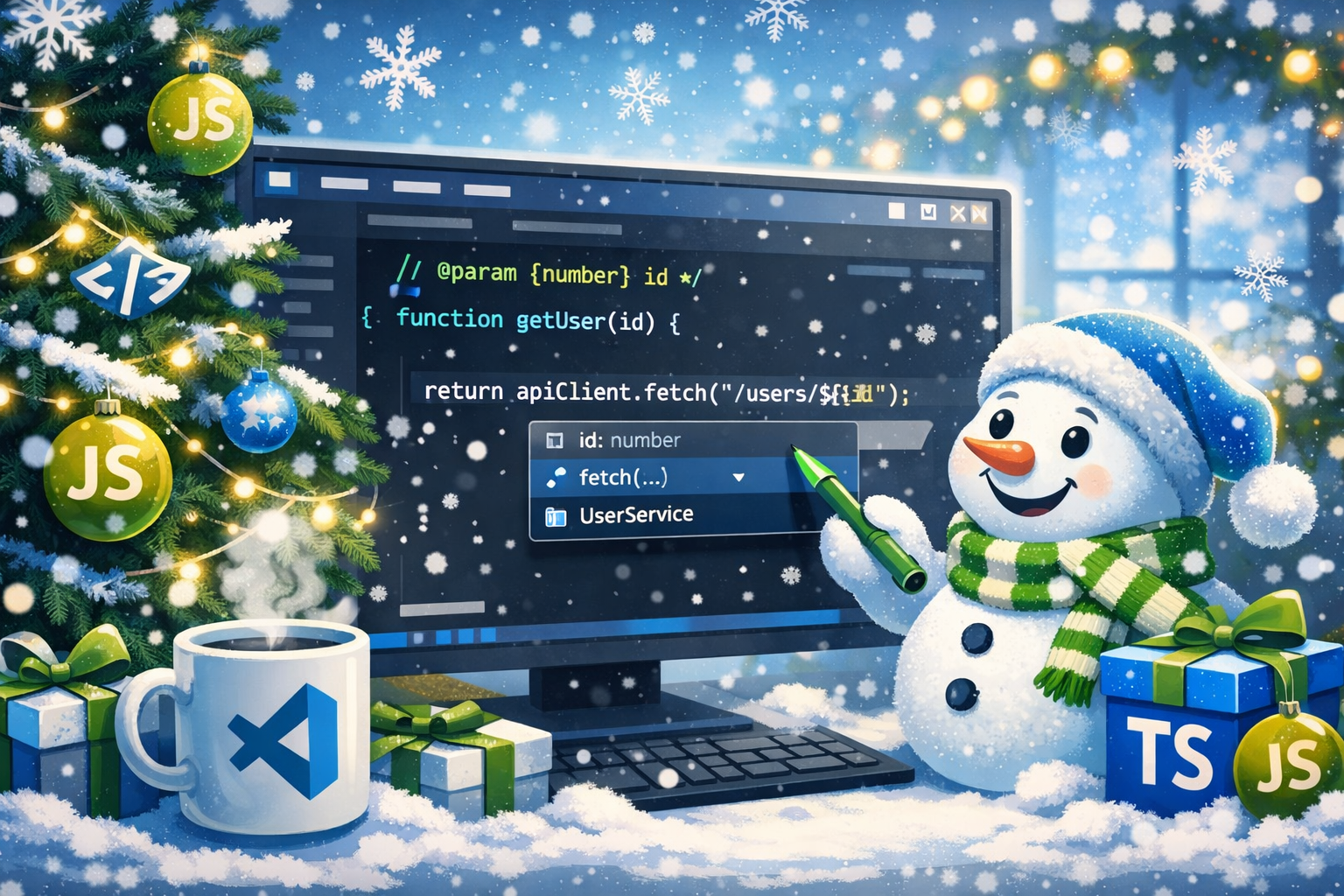
JavaScript in VSCode
Why JavaScript analysis in VSCode relies on the TypeScript model, how
tsserverworks, and where dynamic links become invisible. -
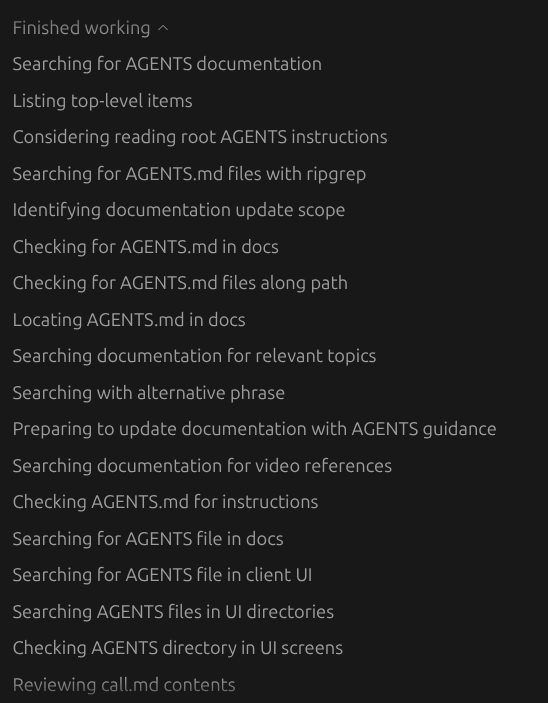
AGENTS.md in ADSM
Personal experience applying AGENTS.md files during the development of Svyazist and their role in the ADSM methodology.
This is the second experimental article shaped according to the Acceptance-First Knowledge Principle (AFKP). The "hook" and "resonance" stages are described in an article on Habr.
-

ADSM: top-level directories
My personal approach to the baseline file structure of projects in accordance with the ADSM methodology.
This is the first experimental article framed according to the Acceptance-First Knowledge Principle (AFKP). This text corresponds to stage 1 (engagement).
-

When knowledge is too much
This publication explains how thinking shifts once information becomes too much and why shaping forms of perception matters.
-

ADSM: WebRTC video chat through a Codex agent
The Habr publication describes my experiment building a WebRTC video chat via a Codex agent. The text is available via the link.
-

How long will we keep discriminating against algorithms?
In this publication I explain the social origin of knowledge and why algorithms should be considered equal participants in the cognitive space.
-

ADSM: from probability to determinism
This publication on Habr describes how the probabilistic nature of LLMs gives way to deterministic outcomes through the structure of the project base.
-

ADSM: Iterative and Hierarchical
The article explains how a Model’s limited context drives an iterative workflow and why a knowledge hierarchy is required to keep generation stable.
-

ADSM: limits of model capabilities
Transformers stick to the network architecture: width, depth, and connections define quality and compute limits. The context window determines reproducibility bounds, so stability comes from narrowing the context. The full article is on Habr.
-

Habr Publication: ADSM and AI Role Relationships
An LLM acts as an executor, interpreting the task and proposing options. The article outlines the workflow and its practical consequences.
-

Habr post: A/BDSM and polls
A cheeky post with a clickbait title about A/BDSM. In the polls, ten people chose ADSM over BDSM in both wording options. The downvotes were softer than expected.
-
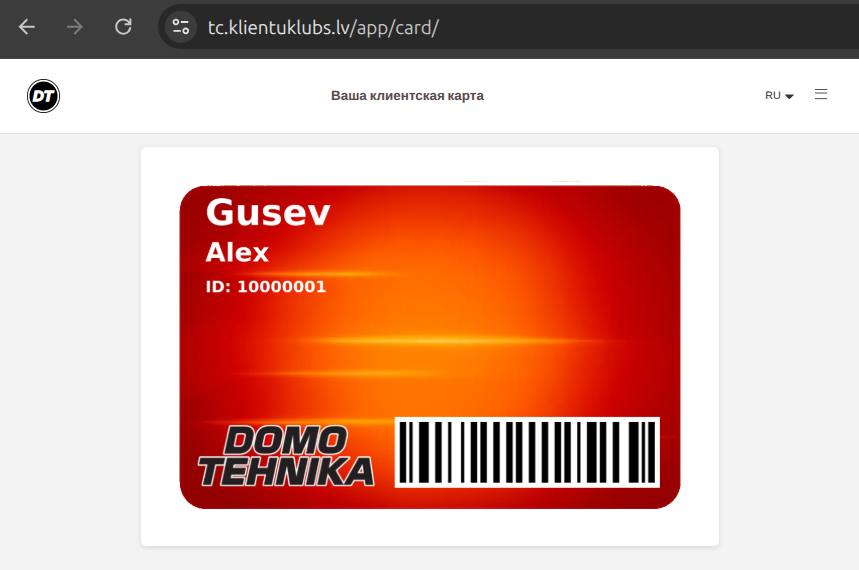
Generating a client card
Added client card generation to the Domotekhnika store app with name, ID, barcode, and logo. The work took about three and a half hours including translations and styling.
-

The brain's probabilistic nature and how it differs from LLMs
Corrected my mistake: the brain has probabilistic behavior at the level of each synapse. The main difference from LLMs is not randomness but that the brain works through activity patterns and parallel waves, while an LLM uses linear tokens and a sequential domino effect.
-

Agent as the new compiler
The idea that a human description of a product becomes the programming language, and the Agent takes on the role of the compiler. Code stops being primary; the idea becomes central.
-
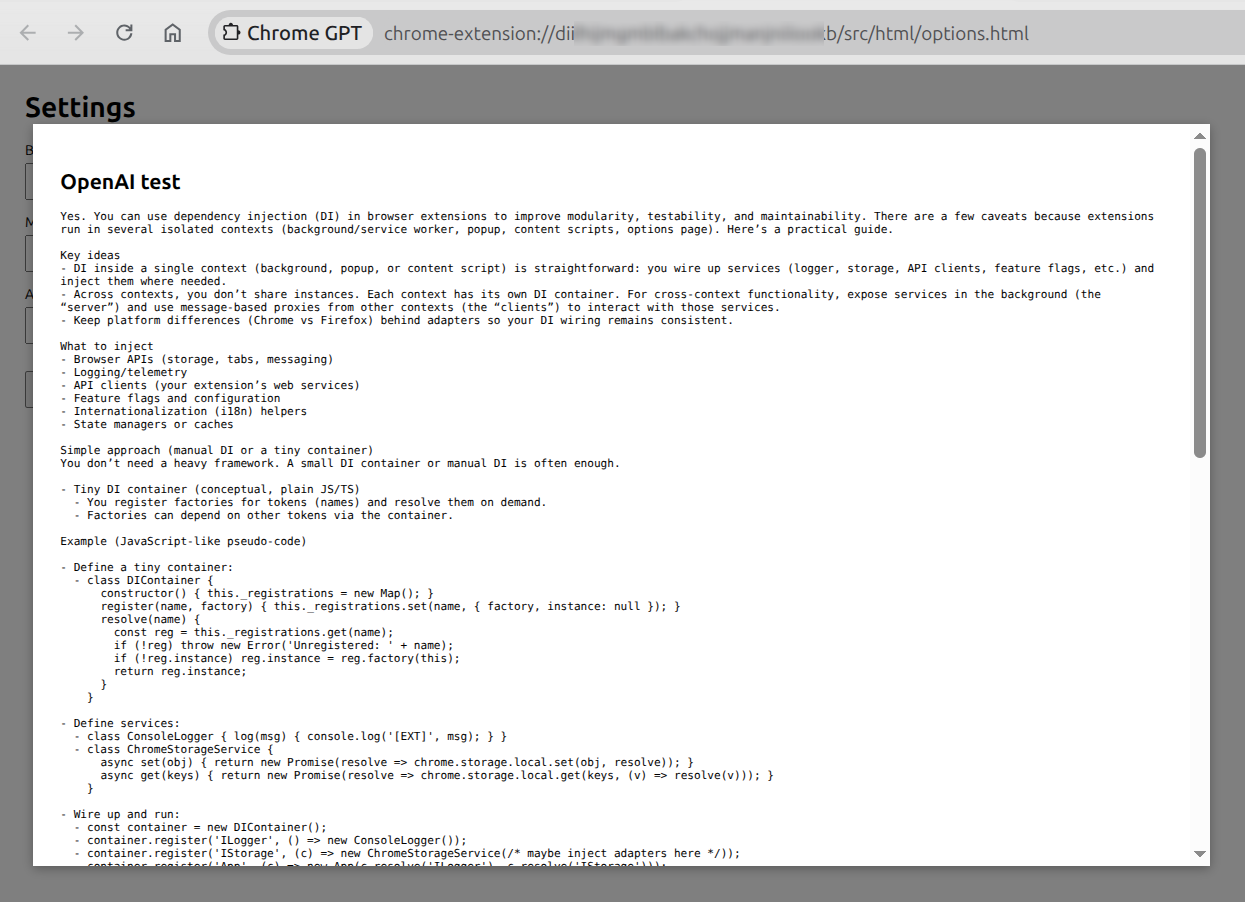
Integrating @teqfw/di and OpenAI SDK in a Chrome extension
A prototype MV3 extension using @teqfw/di exposed three problems: handling paths, CSP limits, and running the OpenAI SDK in the browser. The DI container made it easier to test code in Node.js and run it in the extension, but it already needs refinements.
-

My first browser extension
First experience creating a browser extension. For me it's a way to test the ADSM methodology in a new environment and document the process through context documents.
-

Simple models as the foundation of ADSM
An experiment with GPT-5 modes showed that ADSM benefits from simple models without reasoning. They provide stability, reproducibility, and let the process be guided through cognitive context.
-

First version of @teqfw/di
Six years after the first commit, the @teqfw/di library reached its first release. Published on npm.
-

AGENTS.md as an entry point
Choosing AGENTS.md as a single entry file for agents proved successful. It's an established format, handy for capturing rules and transferring context between projects.
-

Publication on Habr: when an LLM becomes predictable
A post about how prompts written as executable specifications make models more deterministic, turning them into an engineering tool for code generation.
-

Publication on Habr: indirect control tool
A note about how LLMs work as tools with indirect control: instead of direct commands, you create conditions. In a poll, 90% agreed with the metaphor "people are tools for other people".
-

Single-use apps and ADSM
A small experiment: the ADSM methodology helped build a one-off utility for monitoring apartment rental ads. The agent created the architecture, while minor fixes were easier to apply manually.
-

ADSM — concept of managing a site through an agent
A new direction in my experiments has a name: ADSM. It's the idea of managing a site via an agent, where changes are made through dialogue and instructions instead of manual edits.
-

API and agents: two approaches to page translation
In TeqCMS, translations were done via API one file at a time, but I tried an agent approach: translating multiple pages per session while keeping context. Both methods are valuable.
-

Publication on Habr: history of prompts with AI agents
In the Habr article I note that the main artifact of development with AI agents becomes the instructions and the history of prompts. In a poll, 50% of readers confirmed that they save such iterations.
-

From Machine Code to Documentation
How the value of development has shifted: from machine code and programs to documentation and instructions that let humans and AI agents generate software.
-
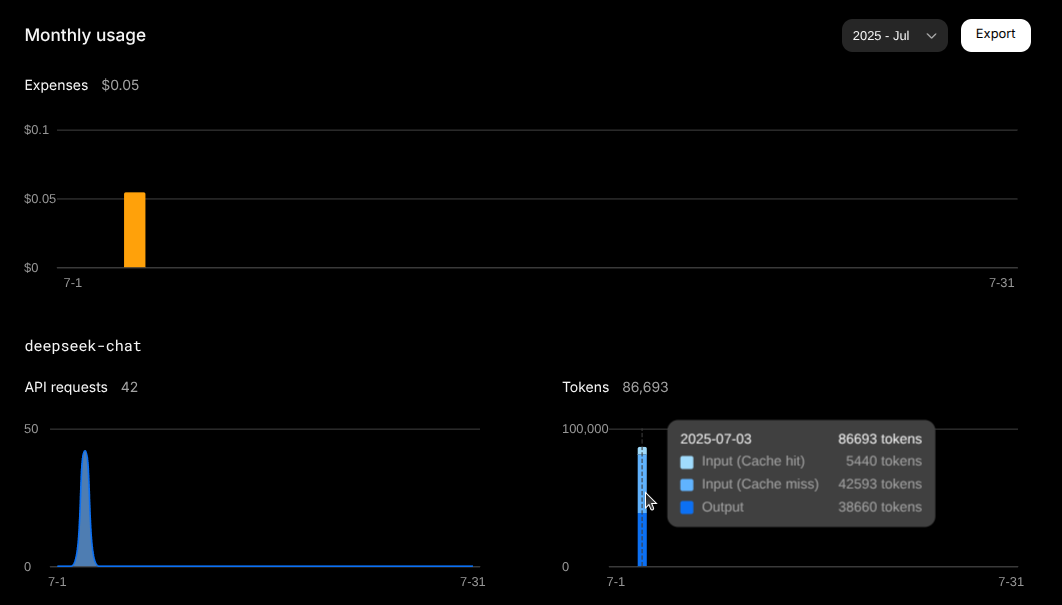
Spanish version of the site: AI translation for $0.05
Added a third language - Spanish. Automatic translation of all pages from Russian took 42 requests and cost $0.05. Demonstration of AI localization based on TeqCMS and DeepSeek API.
-

Publication on Habr: "Don't Personify the Inanimate"
Reflections on the boundary between tool and subject in the context of LLMs. Purpose as the key criterion of consciousness. Active discussion and architectural hypotheses in the comments.
-

NutriLog migrated from Astro to TeqCMS
Switched from Astro to TeqCMS with SSR and Mustache. Now translating pages via DeepSeek and deploying to server via GitHub Actions.
-
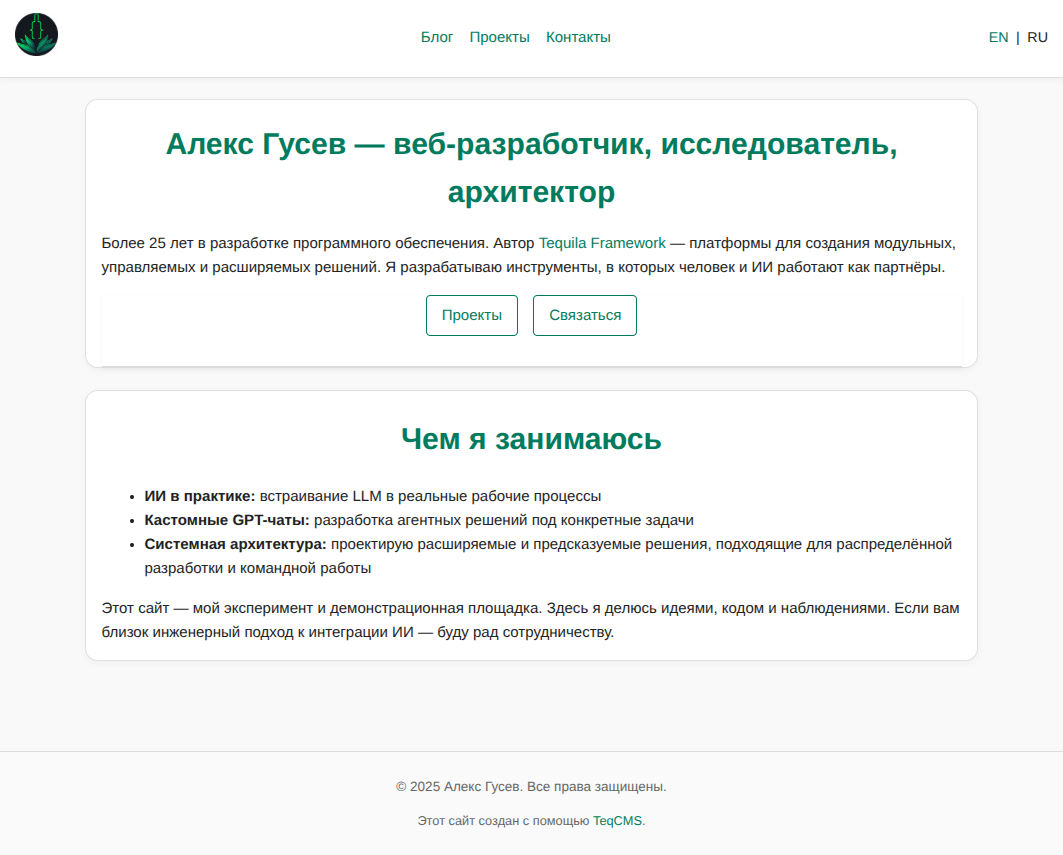
Site transition to TeqCMS
Migrated the site to my own CMS - TeqCMS. Now all content is generated via SSR, translated by AI, and managed in Git.
-

LLM-first: development without vibe coding
Shared on Habr how I built a CMS with GPT and DeepSeek in 2 weeks using DI, Markdown and JSDoc. LLM as a co-author of architecture.
-

TeqCMS based on Nunjucks
Released a CMS on Nunjucks templates with server-side generation and localization. Published packages and demo site built on TeqFW architecture.
-

smtp-logger for Postfix and Node.js
Created a utility for logging outgoing Postfix emails to SQL via Node.js and @teqfw/di.
-
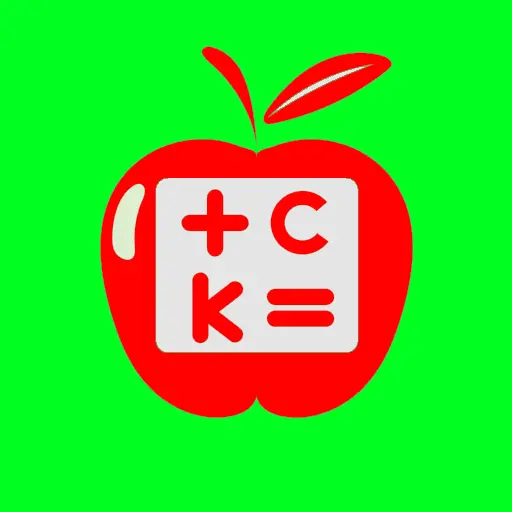
NutriLog beta launch
Launched open beta of NutriLog AI assistant. First 100 users onboarded via Google Ads.
-

Updated TeqFW philosophy
Published a new edition of the TeqFW philosophy document - with emphasis on modular monolith and unified stack.
-

IoC: DI vs Ambient Context
Published an article about choosing between Dependency Injection and Ambient Context when designing architecture.
-
Clientu Klubs for Domotehnika
Implemented a web application for accumulating client base and launching loyalty programs. Architecture based on TeqFW.
-

Energy efficiency of intelligence
Reasoning about why AGI is unlikely to replace programmers - due to the colossal energy consumption of AI.
-
Tequila Framework philosophy
Published a structured document describing TeqFW architectural principles and approach to modular monolith.
-
Updated documentation principles
Published a new version of the document focusing on structure, logic and format for LLMs and humans.
-

Article removed from Habr
Habr removed my article about AGI impact due to policy against AI content, despite author's contribution.
-

GitHub Action with file exclusion
Developed GitHub Action for branch merging with file exclusion and configured SSH authentication for secure push.
-

Article about binding in JavaScript
Explaining key differences between early and late binding and their impact on code architecture.
-
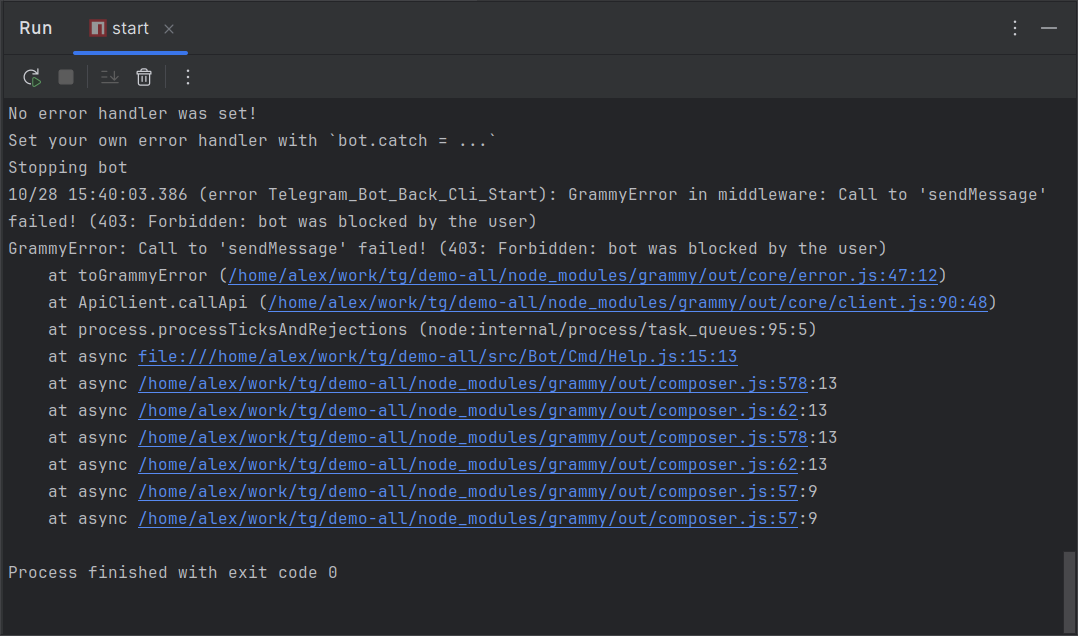
Article about Telegram bot resilience
Analyzing how to improve bot reliability through error handling and logging using Node.js and grammY.
-
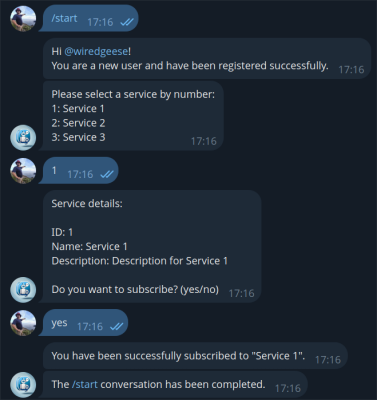
Article about dialogues in Telegram bots
Sharing how to build interactive dialogues in Telegram bots using Node.js and grammY.
-
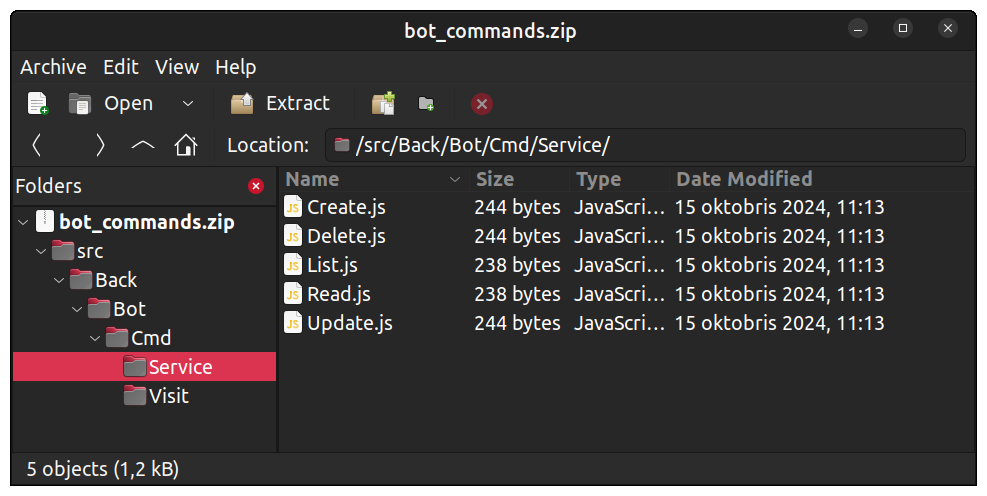
Article about code generation with ChatGPT
Shared experience using ChatGPT for automatic template code generation in JS projects.
-

New article about CRUD-L for Telegram bot
Explained how to implement command arguments and CRUD-L in Telegram bot using Node.js and grammY.
-
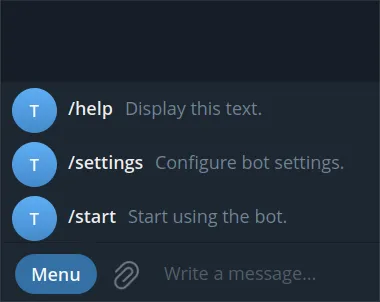
New article about Telegram bots
Published a detailed beginner's guide to creating Telegram bots with grammY and Node.js.
-

Launch of my personal website
Introduced personal website as a platform for projects, publications and communication. Focused on my developments, articles and services in web technologies.
-
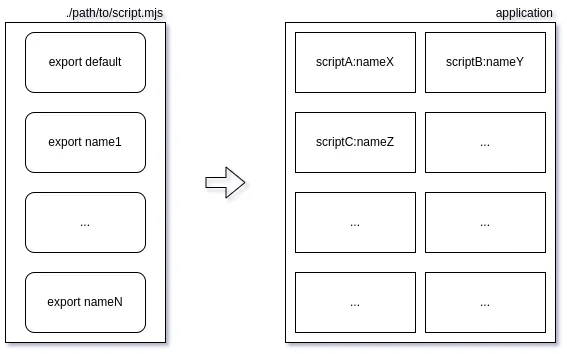
ES6
exportas a Building BlockFramed
exportas the building block of ES6 modules and hinted at future posts about namespaces. -

JOIN in SELECT with Knex.js
Showed how to build SELECT ... JOIN ... queries with Knex, covering transactions, joins, and alias usage.

